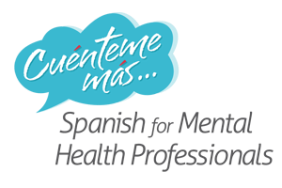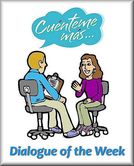
You can become confident working
with Spanish speaking clients.
by Cynthia M. Braden, Licensed Marriage Family Therapist, originator of the program
I did study quite a bit of Spanish in high school and college, and lived with a family in Mérida, Yucatán, Mexico for a semester during junior year at Ohio University.
This was enough to propel me into a Spanish-speaking traineeship in inner-city Los Angeles at the end of my Master's program at Loyola Marymount University in 1997.
In those days, I was pretty good at understanding the Spanish-speaking clients who were teenagers and their parents. Talking to them was another matter. I was tongue tied for a long time. This turned out to be a good thing as I had absolutely no idea what I was doing as a therapist. Oops, I probably shouldn't admit that, but you know the feeling when you first start out seeing clients...
Because I was inefficient at expressing my own thoughts, I focused on what I could do, and became a more effective listener and perceiver of non-verbal information. Someone could argue that this is an impediment, not being able to express yourself completely as a therapist, but I might say it was an unexpected benefit, the clients appreciated the sessions, and they often said "Gracias por escucharme." As a therapist, I learned not to talk too much, and instead to focus on clients' process and help them talk about and make sense of their experiences.
Colleagues were constantly asking me how to improve their clinical Spanish, so in 2009, I began developing the Cuénteme Más curriculum and facilitating small group workshops. (Cuénteme más sobre eso = Tell me more about that.)
I did study quite a bit of Spanish in high school and college, and lived with a family in Mérida, Yucatán, Mexico for a semester during junior year at Ohio University.
This was enough to propel me into a Spanish-speaking traineeship in inner-city Los Angeles at the end of my Master's program at Loyola Marymount University in 1997.
In those days, I was pretty good at understanding the Spanish-speaking clients who were teenagers and their parents. Talking to them was another matter. I was tongue tied for a long time. This turned out to be a good thing as I had absolutely no idea what I was doing as a therapist. Oops, I probably shouldn't admit that, but you know the feeling when you first start out seeing clients...
Because I was inefficient at expressing my own thoughts, I focused on what I could do, and became a more effective listener and perceiver of non-verbal information. Someone could argue that this is an impediment, not being able to express yourself completely as a therapist, but I might say it was an unexpected benefit, the clients appreciated the sessions, and they often said "Gracias por escucharme." As a therapist, I learned not to talk too much, and instead to focus on clients' process and help them talk about and make sense of their experiences.
Colleagues were constantly asking me how to improve their clinical Spanish, so in 2009, I began developing the Cuénteme Más curriculum and facilitating small group workshops. (Cuénteme más sobre eso = Tell me more about that.)

In 2010, I teamed up with Alfonso M. López to improve and expand this specialized program and bring it to you. Alfonso is a native of the Dominican Republic, and is a graduate of the Instituto Tecnológico de Santo Domingo with the degree Licenciatura en Economía.
He began speaking English as an adult, so he knows what it feels like to struggle to learn a new language. He is a patient and creative teacher who corrects our grammar and advises on cultural, colloquial, grammatical, 'real world' and technical issues. He is also a professional actor and businessman, often portraying our 'client' during in vivo training sessions.
By participating in the Cuénteme Más Spanish for Mental Health Professionals program, you can avoid the time-consuming and frustrating trial-and-error process most therapists go through when they want to start working with Spanish speaking clients. We have prepared a lot of material to help you get started implementing your interventions accurately and confidently with appropriate cultural knowledge.
Let us know how we can help you improve service to your Spanish speaking client population. We look forward to meeting you soon.
He began speaking English as an adult, so he knows what it feels like to struggle to learn a new language. He is a patient and creative teacher who corrects our grammar and advises on cultural, colloquial, grammatical, 'real world' and technical issues. He is also a professional actor and businessman, often portraying our 'client' during in vivo training sessions.
By participating in the Cuénteme Más Spanish for Mental Health Professionals program, you can avoid the time-consuming and frustrating trial-and-error process most therapists go through when they want to start working with Spanish speaking clients. We have prepared a lot of material to help you get started implementing your interventions accurately and confidently with appropriate cultural knowledge.
Let us know how we can help you improve service to your Spanish speaking client population. We look forward to meeting you soon.

 RSS Feed
RSS Feed



